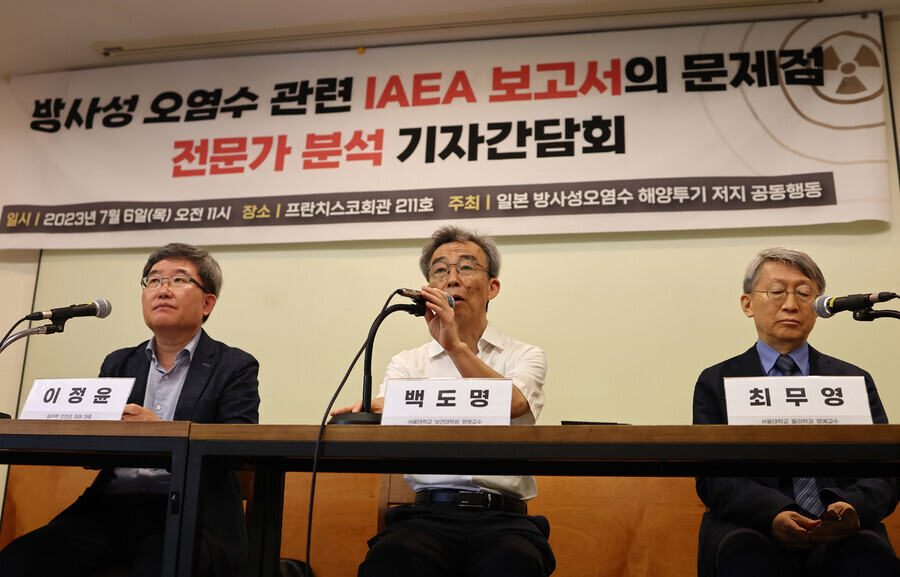hankyoreh
Links to other country sites 다른 나라 사이트 링크
Korean experts decry IAEA Fukushima report as “unscientific”

The International Atomic Energy Agency’s (IAEA) final report concluding that Japan’s plan to discharge contaminated water from the Fukushima Daiichi nuclear power plant meets international safety standards has been criticized by domestic radiation experts as “unscientific and inconsiderate of the complexity of the ecosystem.”
Not only were key verifications lacking, they claim, but the fact that radiation doses were lower than the standard should not automatically erase all potential dangers.
An association calling itself the “Joint Action to Prevent Japan’s Release of Radioactive Water” held a press conference to analyze the problems with the IAEA’s final report at the St. Franciscan Education Center in Seoul’s central Jung District on Thursday.
Lee Jeong-yun, president of the organization Nuclear Power Safety and the Future, Choi Moo-young, professor emeritus of physics at Seoul National University, and Paek Do-myung, professor emeritus of the Seoul National University Graduate School of Public Health, pointed out that the IAEA did not review the performance of the Advanced Liquid Processing System (ALPS), which filters out radionuclides, nor did it make a comprehensive assessment of the impact of the discharge on the ecosystem.
“The biggest problem with the report is that it doesn’t talk about the performance of ALPS at all,” said Lee, an expert in nuclear power plant design. “It claims to remove all radioactive materials except tritium, but there is no reliable data on that.”
Lee pointed out that only the first sample of contaminated water was analyzed and included in the final report. “The results of the analysis of the second and third samples have not even been published yet,” he said, “so it is strange that the final report has already been published.”
It is customary to analyze samples three times in order to get reliable numbers, but the IAEA wrecked its own reliability.
Paek also pointed out that the IAEA’s report skipped key steps, such as a radiological environmental impact assessment.
“The IAEA document says that when you evaluate a facility or program, you have to evaluate all the stages, starting with site assessment and ending with decommissioning, but the IAEA’s evaluation was for commissioning,” he said. “They called it a controlled discharge, but they didn’t evaluate any of the most important verification steps.”
The problem, Choi says, is that the report doesn’t take into account the complex effects on the ecosystem once the contaminated water is released into the sea.
“You can’t look at each nuclide [level], such as cesium, strontium, tritium, etc. independently and say it’s ‘safe’ because it’s lower than the standard,” he said, emphasizing that “complex systems [like ecosystems] are not in a perfectly stable state, and any external disturbance can lead to unexpected results, so an integrated consideration is necessary.”
“It is often assumed that if something is less than the threshold [in terms of radioactive contamination levels], it is safe, but the threshold does not refer to ‘safety’ but to a realistic ‘management standard,’” he said. “If the relationship between risk and association is uncertain, we should reserve judgment and keep a close eye on it as a potential risk.”
Lee criticized the IAEA’s final report, saying that if the discharge of contaminated water is authorized, “we will be able to dump anything as long as we dilute the contaminant with water to reduce its concentration in the future.”
“People literally consider the commons to be public, so they dump their trash there,” said Paek, adding that “the international community shouldn’t be blind to reality.”
By Key Min-do, staff reporter
Please direct questions or comments to [english@hani.co.kr]

Editorial・opinion
![[Column] Will Seoul’s ties with Moscow really recover on their own? [Column] Will Seoul’s ties with Moscow really recover on their own?](https://flexible.img.hani.co.kr/flexible/normal/500/300/imgdb/original/2024/0513/5917155871573919.jpg) [Column] Will Seoul’s ties with Moscow really recover on their own?
[Column] Will Seoul’s ties with Moscow really recover on their own?![[Column] Samsung’s ‘lost decade’ and Lee Jae-yong’s mismatched chopsticks [Column] Samsung’s ‘lost decade’ and Lee Jae-yong’s mismatched chopsticks](https://flexible.img.hani.co.kr/flexible/normal/500/300/imgdb/original/2024/0512/3017154788490114.jpg) [Column] Samsung’s ‘lost decade’ and Lee Jae-yong’s mismatched chopsticks
[Column] Samsung’s ‘lost decade’ and Lee Jae-yong’s mismatched chopsticks- [Correspondent’s column] The real reason the US is worried about Chinese ‘overcapacity’
- [Editorial] Yoon’s gesture at communication only highlights his reluctance to change
- [Editorial] Perilous stakes of Trump’s rhetoric around US troop pullout from Korea
- [Guest essay] Preventing Korean Peninsula from becoming front line of new cold war
- [Column] The state is back — but is it in business?
- [Column] Life on our Trisolaris
- [Editorial] Penalties for airing allegations against Korea’s first lady endanger free press
- [Editorial] Yoon must halt procurement of SM-3 interceptor missiles
Most viewed articles
- 1Seoul’s plan to adopt SM-3 missiles is like wanting a sledgehammer to catch a fly
- 2[Column] Samsung’s ‘lost decade’ and Lee Jae-yong’s mismatched chopsticks
- 3[Correspondent’s column] The real reason the US is worried about Chinese ‘overcapacity’
- 4Korea poised to overtake Taiwan as world’s No. 2 chip producer by 2032
- 560% of young Koreans see no need to have kids after marriage
- 6[Editorial] Yoon’s gesture at communication only highlights his reluctance to change
- 7Yoon voices ‘trust’ in Japanese counterpart, says alliance with US won’t change
- 8Yoon rejects calls for special counsel probes into Marine’s death, first lady in long-awaited presse
- 9S.K.-Japan joint history project to be revived
- 10Former President Roh Tae-woo, mastermind of 1979 military coup, dies at 88